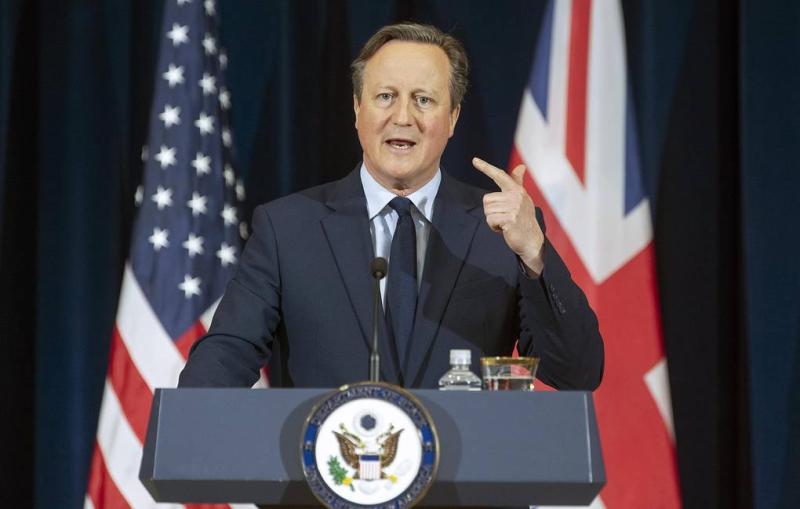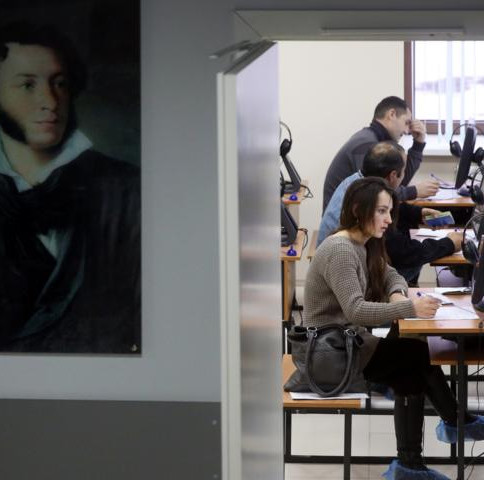
The West is unsure about the ramifications of seizing Russia's frozen assets; the US State Department may have found a way to provide help to Ukraine bypassing the Congress; and Vietnam is hesitant to join BRICS. These stories topped Thursday’s newspaper headlines across Russia, according to TASS News Agency.
Nezavisimaya Gazeta: Russian asset grab to deal blow to West’s bottom line
New proposals for what to do with Russia's frozen state assets will be presented at the G7 summit in June. UK Foreign Secretary David Cameron announced some progress in developing strategies for appropriating Russia's finances, a previously unheard of idea in the history of international relations. Meanwhile, the West is becoming increasingly aware of the harmful implications of seizing Russia's frozen assets - after all, these funds are already being used to fund the debt of major European governments, Nezavisimaya Gazeta writes. In addition to setting a dangerous international precedent, the seizure of these assets could cause significant economic damage to the EU.
G7 and EU governments have frozen some 260 bln euro in Russian assets, the lion’s share of which, over 190 bln euros, is held on the Euroclear platform in Belgium. The EU had earlier proposed a compromise between not touching the money at all and confiscating it outright. Euroclear has decided to keep the profits from Russian assets in separate accounts. In the end, they would be heavily taxed and then used for Ukraine.
The Russian asset grab has long been a hot-button issue, experts told the newspaper. "Pressure from the US has started to grow in recent months, as the White House cannot get congressional approval to finance increased military aid to Ukraine," head of macroeconomic analysis at Finam Olga Belenkaya said. "Unlike American politicians, officials of major European countries and the leadership of the ECB are wary of proposals to confiscate Russian state assets, fearing that this will undermine international confidence, cause an outflow of foreign capital from Europe and jeopardize the stability of the common European currency," she noted.
"The biggest concern among governments is that if Russian assets are taken, other states may face the same risk. In this case, Saudi Arabia, China, and other countries will need to look for other jurisdictions to protect their capital," researcher at RANEPA's Russian Center for Competence and Analysis of OECD Standards Ivan Ermokhin told the newspaper.
In addition, according to Anton Polyakov, associate professor at the Financial University, the West’s measures with regard to Russian assets could lead to an outflow of foreign capital, as it would "set a precedent of hurting the European market due to a failure to follow the simple rules of investing - profitability, reliability and liquidity of investment."
Vedomosti: US State Department finds backdoor for aid to Ukraine amid congressional stalemate
The United States has announced the delivery of Hawk anti-aircraft missile maintenance kits to Ukraine, funded under a new program - the Foreign Military Sale mechanism. But there are very few funds for this, and the $60.1 bln package stuck in Congress will not replace the program, experts told Vedomosti. According to a press release issued by the Pentagon's Defense Security Cooperation Agency (DSCA), US Secretary of State Antony Blinken wanted the deal pushed through based on US national security interests.
The mechanism would make it possible to bypass the requirement for formal congressional approval and the preparation of an export license by the State Department under the Arms Export Control Act of 1976. There is an additional loophole here - the Hawks have previously been provided to Ukraine by presidential order from the US Army. Under the Foreign Military Sale mechanism, the customer government or purchasing agency enters into a contract with the US Department of Defense.
A source told Reuters that Ukraine will pay for the current supply with funds from a $300 mln grant, which was announced in March. This money was included in the draft US defense budget for 2024, which was approved at the end of March.
Despite the fact that the current supply mechanism bypasses congressional oversight, the Biden administration is unlikely to use it regularly, according to corresponding member of the Academy of Military Sciences Sergey Sudakov. The expert told Vedomosti that as long as the Republicans retain the majority in the House of Representatives, any such delivery, especially if it involves weapons, could hurt Biden’s credibility. Therefore, they will not become the norm, meaning such deliveries will have little impact on the situation on the battlefield.
One-time deliveries will not be able to replace the package approved by the Senate, which provides $60.1 bln for Ukraine, senior researcher at the Institute for US and Canadian Studies Igor Shkrobtak noted. The expert believes that it is almost impossible to divide such an amount into mini-packages, considering the time needed to implement contracts.
Izvestia: What is holding Vietnam back from joining BRICS
Vietnam is examining the idea of joining BRICS, assessing in what capacity it could participate in the association, the country's embassy in Russia told Izvestia. Meanwhile, the diplomatic mission did not confirm whether the country submitted an application for membership. Earlier, South Africa’s Foreign Minister published a list of countries that have officially declared their desire to join BRICS, including Vietnam. In addition, Hanoi has not yet received an invitation to the summit of the group, which will be held in October 2024 under Russia's chairmanship. Earlier, Russian Foreign Minister Sergey Lavrov said that not only full members of the association, but also BRICS partners, are welcome in Kazan.
Vietnam is considering joining the association and exactly in what capacity is being discussed, the country's embassy in Moscow told the newspaper. "As far as we know, official positions on these issues are being worked out," the diplomatic mission said.
The fact that Vietnam has not yet formalized its interest in the association probably indicates Hanoi's desire to maintain a political balance, despite the fact that BRICS unites countries based solely on economic interests, Izvestia writes. The United States may see Hanoi as its most important ally in the region in its confrontation with China. Thus, the benefits of bilateral cooperation may outweigh the benefits of joining BRICS, according to the newspaper.
"BRICS cannot offer Vietnam what the US is offering now. What BRICS can offer can be offered by China, as well as Russia, but to a lesser extent than China," Professor at the Department of Public Administration and Public Policy at RANEPA Alexander Savchenko told Izvestia. He noted that Russia is happy to work with anyone, but the expansion of BRICS is a complex process from a political and economic point of view.
In 2023, the country's GDP growth was about 5%, and this is one of the highest rates in Southeast Asia, Senior researcher at the Center for World Politics and Strategic Analysis of the Institute for Systems Analysis of Russian Academy of Sciences Ekaterina Zaklyazminskaya told Izvestia. Vietnam can act as a manufacturing hub, which is very important for China in particular.
Izvestia: Germany expected to deploy 5,000 soldiers to Lithuania by 2027
Germany has begun moving its army brigade to Lithuania, with the first 20 soldiers having already arrived in Vilnius. It is expected that by 2027 a total of 5,000 German soldiers will be stationed in the country. The two countries will spend 800 mln euro on this, Izvestia writes. It is expected that by the end of 2024 the size of the German contingent in the country will increase to 150 people. Lithuania is actively militarizing and purchasing additional weapons, inflating the defense budget and reforming the army conscription system. At the same time, experts told the newspaper, this does not mean a conflict is imminent.
Russia is taking note of what is going on, the newspaper writes. "Tensions continue to escalate, and areas of tension are being created near our borders, which, of course, requires us to take special security measures," Russian presidential spokesman Dmitry Peskov said in response to a question about the creation of a German military base.
Oleg Glazunov, associate professor of the Department of Political Analysis at the Plekhanov Russian University of Economics, believes that it is no coincidence that the German division was transferred to Lithuania. "The country has the largest army in the Baltic states. The number of soldiers in Estonia and Latvia is below 10,000, but in Lithuania the figure reaches 30,000. So, it was decided to rely on those who already have a certain potential," the expert said.
He added that the Russian command should take the militarization of the Baltic country seriously. "Any deployment of NATO troops near our borders puts us on our guard," the expert noted.
Political scientist Vsevolod Shimov told Izvestia that Lithuania borders both Russia and Belarus and the length of the line of contact reaches almost 1,000 km. "In general, the region is obviously militarizing. This does not mean that fighting will start tomorrow or the day after, but tensions will rise," he added.
Vedomosti: EU Court partially removes Russian businessmen Fridman, Aven from sanctions list
On April 10, the EU Court of Justice made a decision to partially cancel sanctions against Russian businessmen Petr Aven and Mikhail Fridman. In 2022, both businessmen, then the main shareholders of Alfa Group, came under restrictions from the EU Council, which considered them close to other sanctioned persons and Russian President Vladimir Putin, Vedomosti writes. At the trial, representatives of Fridman and Aven argued that the evidence provided by the EU Council was unreliable and untrustworthy. The EU court upheld their claims.
"We are satisfied with the decision," Fridman told Vedomosti.
The EU Court's decision has not yet entered into force, and the EU Council has 2 months and 10 days to appeal or correct the shortcomings of its decision, partner at Pen & Paper Kira Vinokurova told Vedomosti. At the same time, only two of the three reasons for imposing sanctions were considered - support for Russia's actions and financial support for its policies in Ukraine. Therefore, regardless of whether these court decisions are challenged, sanctions against Aven and Fridman under the third criterion remain in force and will remain in force until they are annulled by the EU Court within separate cases, the expert said.
This court decision may contribute to challenging sanctions against Fridman and Aven in other jurisdictions, but there is no direct dependence on the decision of the EU court, Vinokurova noted.
The contested legal acts cover the initial inclusion of Aven and Fridman in the sanctions list on February 28, 2022, and its first and second extensions, partner at BGP Litigation Sergey Glandin told the newspaper. As a result of this court ruling, the EU Council may consider eliminating the limitations on these two individuals due to them being unfounded. This would necessitate approval from all 27 EU member states, which is improbable given the current geopolitical context, the lawyer added.
TASS is not responsible for the material quoted in these press reviews









